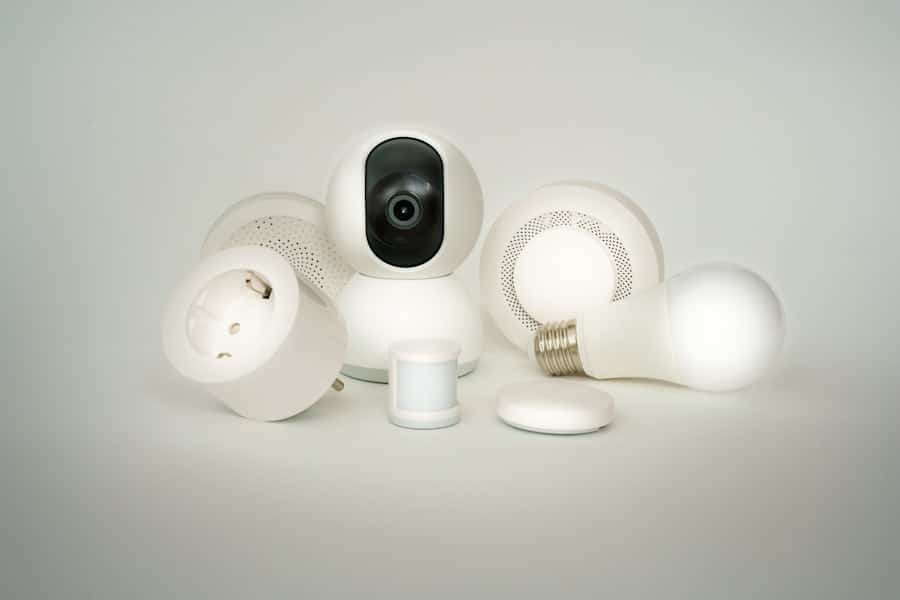In recent years, smart home technology has experienced a meteoric rise, transforming the way we interact with our living spaces. This evolution is driven by advancements in Internet of Things (IoT) devices, which allow homeowners to control various aspects of their homes remotely. From smart thermostats that learn user preferences to security systems that can be monitored via smartphones, the integration of technology into everyday life has become increasingly seamless.
According to a report by Statista, the global smart home market is projected to reach over $135 billion by 2025, highlighting the growing consumer interest in these innovative solutions. The appeal of smart home technology lies not only in convenience but also in energy efficiency and enhanced security. For instance, smart lighting systems can adjust brightness based on natural light levels, reducing energy consumption.
Similarly, smart locks provide homeowners with the ability to monitor and control access to their homes from anywhere in the world. As consumers become more environmentally conscious, the demand for technologies that promote sustainability continues to rise. This shift is further fueled by the increasing availability of affordable smart devices, making it easier for homeowners to adopt these technologies without breaking the bank.
Key Takeaways
- Smart home technology is on the rise, with more and more households adopting devices like smart thermostats, security cameras, and voice assistants.
- Electric vehicles (EVs) are becoming increasingly popular as more people seek environmentally friendly transportation options.
- There is a growing trend towards integrating smart home devices with EV charging stations to create a seamless and convenient experience for users.
- Integrating smart home devices with EV charging stations can provide benefits such as energy optimization, cost savings, and enhanced user experience.
- Examples of smart home devices that can integrate with EV charging stations include smart plugs, energy monitors, and home automation systems.
The Growing Popularity of Electric Vehicles
Environmental Benefits and Government Support
This surge in popularity is expected to continue as more automakers commit to electrifying their fleets and governments implement stricter emissions regulations.
Cost-Effective and Convenient
The appeal of electric vehicles extends beyond their environmental benefits. Many consumers are drawn to the lower operating costs associated with EVs, including reduced fuel expenses and lower maintenance requirements.
Advancements in Technology and Infrastructure
Additionally, advancements in battery technology have led to longer ranges and faster charging times, addressing some of the initial concerns that potential buyers had regarding EVs. As charging infrastructure expands and becomes more accessible, the barriers to entry for adopting electric vehicles continue to diminish, making them an increasingly viable option for a broader audience.
Integration of Smart Home Devices with EV Charging Stations

As the popularity of electric vehicles continues to rise, the integration of smart home devices with EV charging stations presents an exciting opportunity for homeowners. This integration allows for a more streamlined and efficient charging experience while enhancing the overall functionality of smart home ecosystems. By connecting EV chargers with smart home technology, users can monitor charging sessions, schedule charging times based on electricity rates, and even receive notifications when their vehicle is fully charged.
One of the key benefits of this integration is the ability to optimize energy consumption. Smart home systems can analyze energy usage patterns and adjust charging schedules accordingly. For example, if a homeowner has a time-of-use electricity plan that offers lower rates during off-peak hours, the smart home system can automatically schedule EV charging during those times.
This not only saves money but also helps reduce strain on the electrical grid during peak demand periods.
Benefits of Integrating Smart Home Devices with EV Charging Stations
The integration of smart home devices with EV charging stations offers numerous benefits that enhance both convenience and efficiency for homeowners.
This level of control allows users to start or stop charging from anywhere, ensuring that they can manage their vehicle’s energy needs even when they are away from home.
Moreover, this integration can lead to significant cost savings. By utilizing smart home technology to optimize charging schedules based on electricity rates, homeowners can take advantage of lower rates during off-peak hours. Additionally, some smart chargers are equipped with features that allow them to draw energy from renewable sources, such as solar panels installed on the home.
This not only reduces reliance on fossil fuels but can also lead to substantial savings on electricity bills over time.
Examples of Smart Home Devices That Can Integrate with EV Charging Stations
Several smart home devices are designed specifically to integrate seamlessly with EV charging stations, enhancing the overall user experience. One prominent example is the smart EV charger itself, which often comes equipped with Wi-Fi connectivity and compatibility with various smart home ecosystems. Brands like ChargePoint and Wallbox offer chargers that can be controlled via mobile apps, allowing users to monitor charging status and adjust settings remotely.
In addition to smart chargers, other devices such as smart thermostats and energy management systems can play a crucial role in this integration. For instance, a smart thermostat can communicate with an EV charger to optimize energy usage throughout the home. If the thermostat detects that energy consumption is high due to heating or cooling demands, it can delay EV charging until energy usage decreases.
This level of coordination ensures that homeowners can maximize their energy efficiency while keeping their vehicles charged and ready for use.
Challenges and Considerations for Integrating Smart Home Devices with EV Charging Stations

Despite the numerous benefits associated with integrating smart home devices with EV charging stations, several challenges and considerations must be addressed. One primary concern is compatibility among different devices and platforms. With a plethora of manufacturers producing smart home devices and EV chargers, ensuring that all components work together seamlessly can be a daunting task for homeowners.
Standardization across devices is essential for creating a cohesive ecosystem that maximizes functionality. Another challenge lies in cybersecurity risks associated with connected devices. As more homeowners embrace smart technology, the potential for cyberattacks increases.
Hackers may target vulnerable devices within a smart home network, potentially compromising sensitive information or disrupting critical systems like EV charging stations. Homeowners must prioritize security measures such as strong passwords, regular software updates, and network segmentation to mitigate these risks effectively.
Future Trends in Smart Home Technology and EV Charging Integration
Looking ahead, several trends are likely to shape the future of smart home technology and its integration with EV charging stations. One notable trend is the increasing emphasis on sustainability and renewable energy sources. As more homeowners invest in solar panels and other green technologies, the demand for smart chargers that can utilize renewable energy will grow.
This shift will not only enhance energy efficiency but also contribute to reducing carbon footprints. Additionally, advancements in artificial intelligence (AI) and machine learning will play a pivotal role in optimizing energy management within smart homes. Future systems may leverage AI algorithms to analyze user behavior and preferences more accurately, allowing for even greater customization of charging schedules and energy usage patterns.
This level of sophistication will enable homeowners to achieve optimal efficiency while minimizing costs.
The Future of Smart Home Devices and EV Charging Stations
The convergence of smart home technology and electric vehicle charging stations represents a significant step forward in creating more efficient and sustainable living environments. As both industries continue to evolve, homeowners will benefit from enhanced convenience, cost savings, and improved energy management capabilities. The integration of these technologies not only addresses current consumer demands but also paves the way for a greener future where homes are equipped to support electric mobility seamlessly.
As we move forward into an era defined by innovation and sustainability, it is clear that the relationship between smart home devices and electric vehicle charging stations will only deepen. With ongoing advancements in technology and growing consumer awareness about environmental issues, this integration will become increasingly vital in shaping how we live and interact with our homes and vehicles in the years to come.
Smart home devices are becoming increasingly integrated with various aspects of our lives, including electric vehicle (EV) charging stations. This integration allows for more efficient and convenient charging of EVs, as highlighted in the article “Unlock the Power of the Galaxy with the Samsung S22 Ultra.” By utilizing smart home technology, EV owners can remotely monitor and control their charging stations, ensuring that their vehicles are always ready to go.
FAQs
What are smart home devices?
Smart home devices are electronic devices that can be controlled remotely or automatically through a smartphone, tablet, or voice assistant. These devices are designed to make homes more efficient, convenient, and secure.
What are EV charging stations?
EV charging stations are infrastructure that allows electric vehicles to recharge their batteries. These stations can be found in public places, workplaces, and homes, and they come in different types, including Level 1, Level 2, and DC fast chargers.
How are smart home devices integrating with EV charging stations?
Smart home devices are integrating with EV charging stations through the use of smart charging technology. This technology allows users to monitor and control their EV charging stations remotely, schedule charging times to take advantage of off-peak electricity rates, and integrate with renewable energy sources such as solar panels.
What are the benefits of integrating smart home devices with EV charging stations?
Integrating smart home devices with EV charging stations allows for greater control and optimization of charging processes. This can result in cost savings, reduced environmental impact, and increased convenience for EV owners.
What types of smart home devices can integrate with EV charging stations?
A variety of smart home devices can integrate with EV charging stations, including smart plugs, smart thermostats, energy management systems, and home automation platforms. These devices can provide insights into energy usage, enable remote control of charging, and facilitate integration with smart grids and renewable energy sources.

